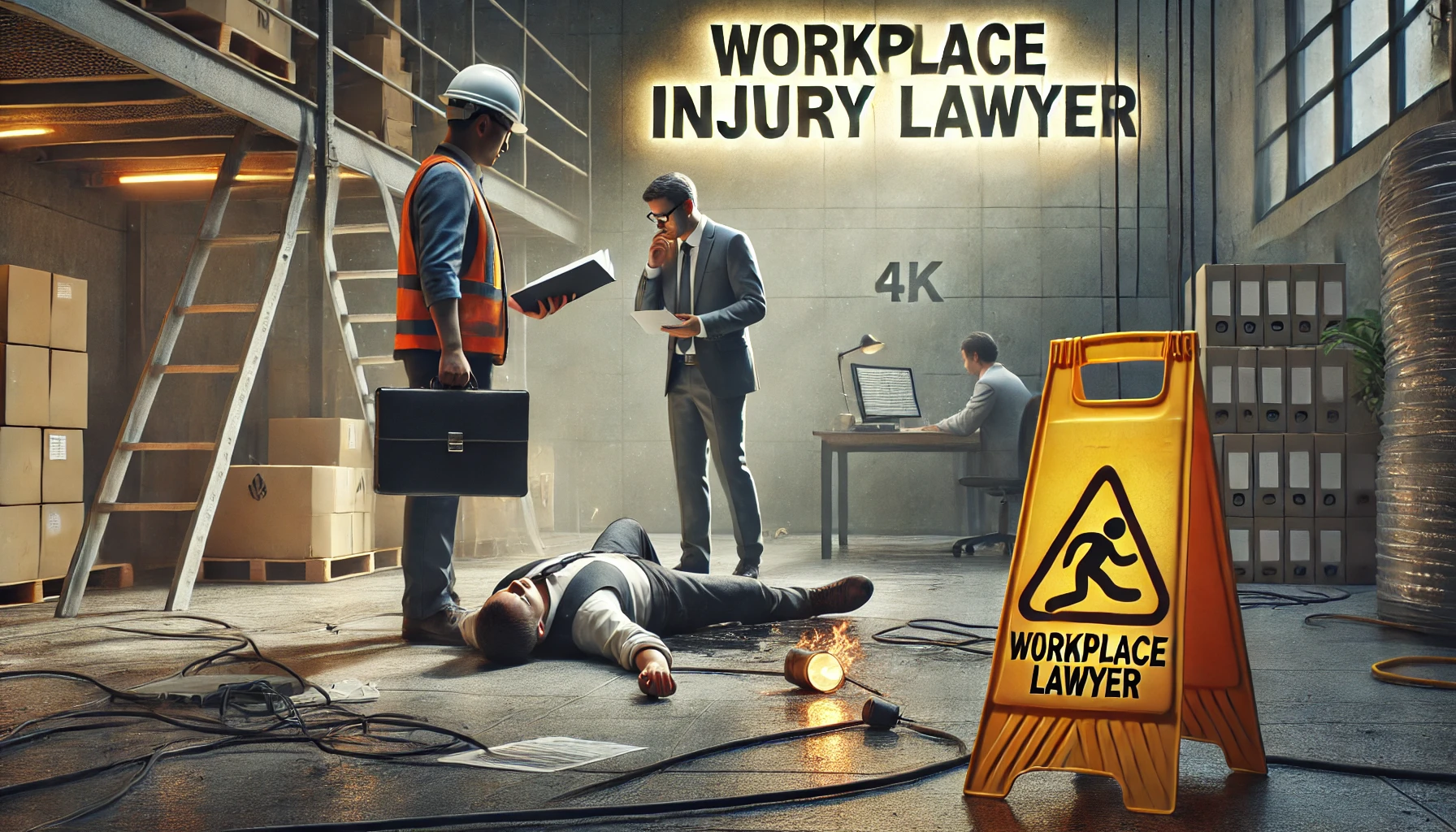Introduction
A workplace injury lawyer helps employees who get hurt at work. Their job is to make sure injured workers get the help they need. When someone is hurt on the job, they might need medical care, time off, or even money to support their family. A workplace injury lawyer makes sure the injured worker gets all these things. They know the rules and can fight for the worker’s rights. This is very important because many injured workers do not know what they deserve. The workplace injury lawyer is there to help and guide them through the process.
Understanding Workplace Injuries
Common Types of Workplace Injuries:
At work, many injuries can happen. Some common types are slips, trips, falls, machinery accidents, burns, and repetitive strain injuries. Slips, trips, and falls can happen on wet floors or uneven surfaces. Machinery accidents occur when workers use tools or machines incorrectly or when the machines malfunction. Burns can result from working with fire, chemicals, or hot surfaces. Repetitive strain injuries develop from doing the same motion over and over, like typing or lifting.
Causes of Workplace Accidents:
Workplace accidents often happen because of unsafe conditions, equipment malfunctions, lack of training, and human error. Unsafe conditions include things like slippery floors, poor lighting, or cluttered walkways. Equipment malfunctions occur when machines break or do not work properly. Lack of training means workers do not know how to use equipment safely or do their job correctly. Human error includes mistakes made by workers, like not following safety rules or being careless.
Workers’ Compensation vs. Personal Injury Claims
Workers’ Compensation Claims:
Workers’ compensation is a system that helps workers who get hurt on the job. It provides benefits like medical expenses, lost wages, and sometimes rehabilitation. When filing a workers’ compensation claim, the worker must report the injury to their employer, get medical treatment, and fill out necessary forms. This process ensures the injured worker gets the help they need without proving fault.
Personal Injury Claims:
Personal injury claims differ from workers’ compensation. These claims involve suing someone who caused the injury through third-party negligence. For example, if a worker is hurt because of faulty equipment made by another company, they might file a personal injury lawsuit. This type of claim can provide additional compensation, including pain and suffering, which workers’ compensation does not cover.
Legal Rights and Options
Employee Rights:
After a workplace injury, employees have several rights. They have the right to return to work when they are healed. If they cannot return, they might get disability compensation. Employees can also appeal decisions if they disagree with what their employer or insurance company decides about their claim.
Third-Party Claims:
A third-party claim happens when someone other than the employer is responsible for the injury. For example, if an injury is caused by defective equipment or the negligence of another company, the injured worker can file a third-party claim. This can provide additional compensation beyond what workers’ compensation offers.
Role of a Workplace Injury Lawyer
When to Hire a Lawyer:
Hiring a workplace injury lawyer is beneficial in several situations. If a case is complex, such as involving serious injuries or multiple parties, a lawyer can help navigate the process. If a claim is denied, a lawyer can assist in appealing the decision. When the injury is caused by a third party, a lawyer can help file a separate personal injury lawsuit to seek additional compensation.
Services Provided:
Workplace injury lawyers offer many services. They provide legal advice to help understand your rights and options. They assist in filing claims to ensure all paperwork is completed correctly. They represent clients in court, advocating on their behalf. Lawyers also negotiate settlements to get the best possible compensation for their clients.
Steps to Take After a Workplace Injury
Reporting the Injury:
Reporting a workplace injury involves several steps. First, notify your employer immediately, ideally within 24 hours. Fill out an injury report form provided by your employer. Include details like the date, time, location, and description of the injury. Keep a copy of this report for your records.
Seeking Medical Attention:
It is crucial to seek medical attention right away. This ensures your health and creates a medical record of the injury. Follow all medical advice and keep detailed records of all treatments and expenses. This documentation is essential for your workers’ compensation claim and any potential legal actions.
Choosing the Right Lawyer
Qualities to Look For:
When choosing a workplace injury lawyer, look for specific qualities. Experience is crucial; a lawyer with years of handling workplace injury cases knows the ins and outs. Check their success rate to see how often they win cases and secure good settlements. Read client reviews to learn about other people’s experiences with the lawyer. Finally, ensure they specialize in workplace injuries, as this expertise can make a big difference in your case.
Questions to Ask:
During consultations, ask potential lawyers important questions. How many workplace injury cases have you handled? What is your success rate in these cases? How do you communicate with clients, and how often? What are your fees, and do you work on a contingency basis? Asking these questions helps ensure the lawyer is a good fit for your needs.
Conclusion
Choosing the right workplace injury lawyer is essential for getting the best outcome for your case. Look for experience, a high success rate, positive client reviews, and specialization in workplace injuries. Ask the right questions during consultations to ensure they are the right fit for you. With the right lawyer, you can navigate the complexities of your case and secure the compensation you deserve.
FAQs
What are the three types of workplace injuries?
- Slips, trips, and falls – These can happen on wet floors, uneven surfaces, or cluttered walkways.
- Machinery accidents – Injuries caused by tools or machines, especially if used incorrectly or if they malfunction.
- Repetitive strain injuries – Injuries from doing the same motion repeatedly, like typing or lifting.
What should be done immediately after an injury in the workplace?
- Report the injury to your employer as soon as possible.
- Seek medical attention immediately to ensure your health and document the injury.
- Document the incident by filling out an injury report form provided by your employer.
What should you do immediately after receiving an injury?
- Notify your employer about the injury.
- Get medical care promptly to address the injury and get a medical record.
- Keep records of all treatments and expenses related to the injury.
How to respond to workplace injury?
- Report the injury to your employer without delay.
- Seek medical attention to address your injury and start a medical record.
- Document everything related to the injury, including filling out an official report and keeping copies for yourself.
Explore the Personal injury realm with The Expert Law. Visit our website for limitless inspiration!





